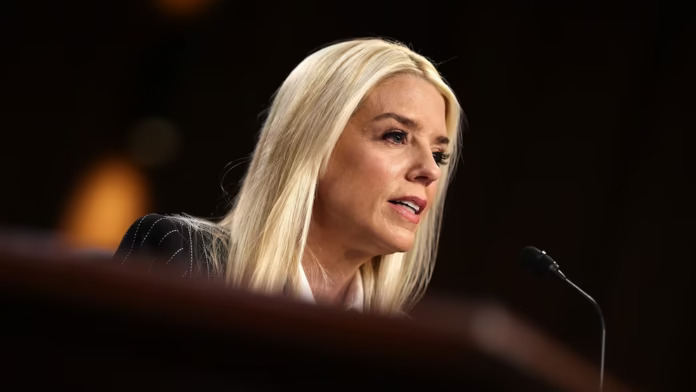Bondi Fires DOJ Employee After Explosive Conduct Caught on Camera — Inside the Decision That’s Shaking Washington
In the halls of Washington’s Justice Department, a new tone of leadership has taken hold — one that’s firm, uncompromising, and unapologetic. Attorney General Pam Bondi’s latest decision to dismiss a Department of Justice employee has once again made headlines, signaling that the nation’s top law enforcement agency is entering a new era of accountability and discipline.
The removal of paralegal Elizabeth Baxter, following a string of inappropriate incidents caught on camera, has sparked debate over what it truly means to serve in federal law enforcement. Her dismissal is part of a growing pattern that reflects Bondi’s commitment to enforcing professional standards and eliminating what she considers misconduct within the ranks.
A Pattern of Behavior That Couldn’t Be Ignored
According to internal reports, the incident began on August 18th when Baxter allegedly made an obscene gesture toward a National Guard member near Washington’s Metro Center, accompanied by verbal insults. What might have been seen as a one-time lapse was later confirmed through surveillance footage showing repeated behavior throughout the day.
Just a week later, on August 25th, Baxter reportedly made similar comments to a DOJ security guard, once again expressing hostility toward the military. Multiple witnesses and recordings documented the incidents, leaving little room for ambiguity.
The Attorney General’s office deemed the behavior a direct violation of professional standards expected of federal employees. Bondi signed Baxter’s termination letter personally, emphasizing that “disrespect for law enforcement personnel” would not be tolerated within the Department of Justice.
The Symbolism Behind the Setting
The events took place at the DOJ’s 4CON building in Washington’s NoMa district, a facility that has become a focal point for tensions between career employees and the administration’s leadership. It was also the same building where another DOJ employee, paralegal Sean Charles Dunn, was recently fired after a separate public altercation involving federal officers — an episode that went viral online.
The close timing and proximity of these two terminations suggest that Bondi’s office is sending a clear message about conduct, loyalty, and the image of federal service during a politically charged time.
The Importance of Documentation
In both the Dunn and Baxter cases, the Justice Department relied heavily on security footage and eyewitness statements to ensure due process was followed. Such evidence minimizes the possibility of a wrongful termination appeal and establishes a defensible legal record.
Federal law requires strict adherence to procedural fairness when disciplining career employees, and Bondi’s office has appeared deliberate in meeting those requirements. Every report, witness statement, and camera recording was included in the review, ensuring that the decision could withstand internal and legal scrutiny.
The Case That Started It All
Baxter’s dismissal closely follows the earlier termination of Dunn, whose highly publicized confrontation with federal law enforcement officers involved shouting and throwing a sandwich at an officer. Video footage of the incident circulated widely, and his actions were seen as emblematic of growing internal tensions between career DOJ workers and the administration.
Bondi’s response at the time was blunt and public. “You cannot work for this Department while disrespecting our government and those who defend it,” she said. Her message was not limited to one employee—it was directed at the entire federal workforce.
A Broader Push for Accountability
These terminations are part of a larger realignment within the Department of Justice, one that Bondi and her team describe as necessary to restore integrity, respect, and alignment with the agency’s mission. “This DOJ remains committed to defending the rule of law and supporting those who enforce it,” she said.
Critics argue, however, that the firings reflect a more political motive—an attempt to suppress dissenting opinions within the federal service. Supporters counter that the Attorney General is simply restoring discipline and ensuring that federal employees uphold the dignity and neutrality of their positions.
Navigating Free Speech and Professional Conduct
The controversy highlights a broader tension that has long existed in public service: where does freedom of political expression end, and professional responsibility begin?
Federal employees are permitted to hold personal political beliefs, but they are expected to remain impartial and respectful while performing their duties. In both of the recent DOJ cases, officials determined that the conduct had crossed from private opinion into public disrespect toward law enforcement partners—behavior incompatible with the department’s mission.
Beyond Controversy: DOJ’s Continued Mission
Despite the attention drawn by these disciplinary actions, the Justice Department continues to carry out high-profile operations. A recent example, known as Operation Grayskull, dismantled several major dark web platforms involved in child exploitation, resulting in multiple convictions nationwide.
Such successes highlight that, while internal reforms continue, DOJ’s core mission—to enforce federal law and protect the public—remains active and effective.
A Turning Point for Federal Employment
The firings of Baxter and Dunn mark a defining moment in how the Department of Justice—and perhaps federal agencies more broadly—handle misconduct and political expression. For decades, civil service protections have made dismissals rare and slow-moving. Bondi’s approach, by contrast, has been fast, documented, and final.
Whether this signals a positive shift toward stronger accountability or a potential erosion of bureaucratic independence will depend on how consistently and fairly such measures are applied. What’s clear is that a new standard has been set: professionalism, respect for law enforcement, and alignment with the department’s mission are now viewed as essential—not optional—qualities for federal service.
The New Standard
The Department of Justice’s message to its employees is unambiguous. Professionalism must be unwavering. Respect for the rule of law is non-negotiable. And conduct—both inside and outside the workplace—reflects not just on the individual but on the integrity of the entire institution.
In this new era of federal employment, the expectation is clear: represent the mission with respect, or risk losing the privilege of serving it.


